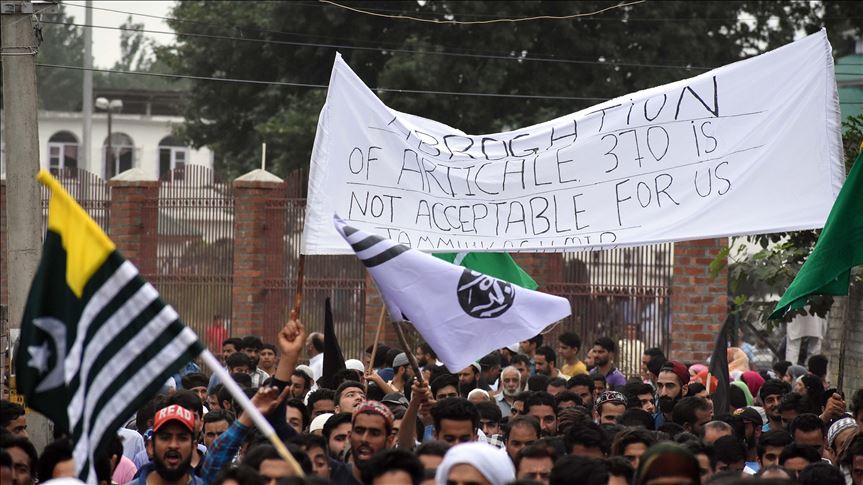
The recent elections in Indian-occupied Jammu and Kashmir (IoJK) have once again exposed the puppet-like role of some local politicians, particularly National Conference (NC) leader Omar Abdullah. Questions about the authenticity of the electoral process and the true motives behind the elections have arisen following his conflicting statements on Article 370—the provision that grants special autonomy to Jammu and Kashmir. Abdullah’s shift from a pledge to restore the region’s special status during his campaign to now dismissing it as ‘foolish’ suggests he has betrayed the trust of the Kashmiri people.
Election Campaign Promises
Omar Abdullah’s National Conference ran an aggressive election campaign centered on the promise to restore Article 370. The party’s manifesto emphasized reinstating Kashmir’s autonomy and reversing the Indian government’s August 2019 decision to revoke the region’s special status. This pledge resonated strongly with the Kashmiri people, who have long felt marginalized under Indian rule. Throughout the campaign, Abdullah and his party consistently highlighted the injustices faced by Kashmiris under the Modi government, drawing attention to its efforts to suppress the region’s distinct identity.
Post-Election Reconciliation
However, after the elections concluded and Abdullah’s party emerged victorious, the rhetoric took a complete 180-degree turn. Suddenly, Abdullah adopted a more conciliatory tone, having previously criticized the Indian government for its heavy-handed approach in Kashmir. He even praised Indian Prime Minister Narendra Modi, calling him an ‘honest man’ and expressing confidence that he would not break his promises to the people of Kashmir. This shocking statement comes in light of Modi’s government being responsible for the abrogation of Article 370 in 2019—an act many in Kashmir consider a final blow to the region’s autonomy. This backtracking has not only raised eyebrows but also confirmed suspicions that the elections were merely a sham.
The Political Game
Abdullah’s volte-face is viewed by critics as part of a larger political game in which local politicians like him are pawns of the Indian government, used to legitimize its rule over the region. For decades, India has touted elections in Kashmir as indicators of normalcy and progress. Yet these elections have consistently been marred by allegations of vote rigging, low voter turnout, and widespread disillusionment among the populace. The most recent elections were no exception, with reports indicating voter turnout as low as 8%, a clear sign of the public’s lack of faith in the system.
A Puppet of the Indian Government
The National Conference, under Abdullah’s leadership, has long been accused of acting as a puppet of the Indian government. Despite its rhetoric of resistance, the party has often aligned itself with New Delhi’s interests at the expense of the Kashmiri people. This perception has only been reinforced by the most recent elections, as Abdullah indicated that his party would work with the BJP government for the ‘welfare’ of Kashmir, rather than standing firm on the promise to restore Article 370. This represents a thinly veiled admission that the National Conference is prepared to collaborate with the very forces that have subjugated the region and stripped it of its autonomy.
Alienation and Distrust
This is troubling on a broader scale. Omar Abdullah has further alienated the Kashmiri people from the political process by participating in these elections and reneging on his promises. Many Kashmiris already regard the electoral process as a farce—a mechanism for India to legitimize its occupation of the region. Abdullah’s actions have only reinforced this belief. Instead of being a voice of resistance, he has become just another Kashmiri politician prioritizing his political career over the will of the people.
A Call for Trust
Abdullah’s assertion that Kashmiris should trust Modi and Home Minister Amit Shah’s ‘vision for Kashmir’ is deeply concerning. Recent policies under Modi’s government have led to some of the most draconian measures in Kashmir, including the abrogation of Article 370, prolonged lockdowns, and the violent suppression of dissent. To ask Kashmiris to trust this government is to overlook the numerous human rights violations and abuses that have occurred under its watch.
The Protracted Conflict
The case of Kashmir, a conflict that has persisted for over seven decades, remains one of the most protracted territorial disputes on the planet. Since the partition of India and Pakistan in 1947, the region has been a flashpoint of violence and unrest. The conflict has claimed tens of thousands of lives, with millions displaced. Since 1989, more than 95,000 Kashmiris have been killed, with thousands subjected to enforced disappearances and extrajudicial killings, according to recent estimates. While world leaders and diplomats may turn a blind eye, the suffering of the Kashmiri people continues unabated.
Conclusion
The challenges faced by the Kashmiri people are starkly illustrated by the recent elections and the subsequent actions of politicians like Omar Abdullah. While the Indian government continues to tout these elections as a sign of progress and normalcy, the reality on the ground is vastly different. Kashmiris are enduring the weight of a brutal occupation, with little hope for meaningful political change. Until politicians like Abdullah cease to act as puppets of the Indian state, the dream of an independent, self-determining Kashmir will remain just that—a dream. The people of Kashmir have suffered for decades and deserve leaders who will genuinely fight for their rights and resist those who wish to silence them. As long as the current political order persists, the despair and hopelessness felt by many Kashmiris are unlikely to dissipate.



















Leave a Reply